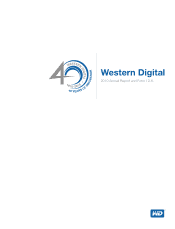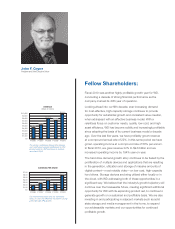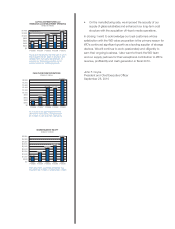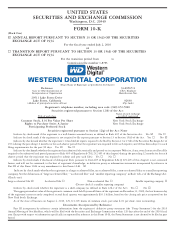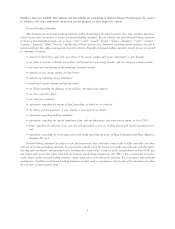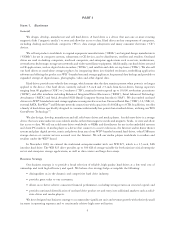Western Digital 2010 Annual Report Download - page 10
Download and view the complete annual report
Please find page 10 of the 2010 Western Digital annual report below. You can navigate through the pages in the report by either clicking on the pages listed below, or by using the keyword search tool below to find specific information within the annual report.PART I
Item 1. Business
General
We design, develop, manufacture and sell hard drives. A hard drive is a device that uses one or more rotating
magnetic disks (“magnetic media”) to store and allow fast access to data. Hard drives are key components of computers,
including desktop and notebook computers (“PCs”), data storage subsystems and many consumer electronic (“CE”)
devices.
We sell our products worldwide to original equipment manufacturers (“OEMs”) and original design manufacturers
(“ODMs”) for use in computer systems, subsystems or CE devices, and to distributors, resellers and retailers. Our hard
drives are used in desktop computers, notebook computers, and enterprise applications such as servers, workstations,
network attached storage, storage area networks and video surveillance equipment. Additionally, our hard drives are used
in CE applications, such as digital video recorders (“DVRs”), and satellite and cable set-top boxes (“STBs”). We also sell
our hard drives as stand-alone storage products by integrating them into finished enclosures, embedding application
software and offering the products as WD
»
-branded external storage appliances for personal data backup and portable or
expanded storage of digital music, photographs, video and other digital data.
Hard drives provide non-volatile data storage, which means that the data remains present when power is no longer
applied to the device. Our hard drives currently include 3.5-inch and 2.5-inch form factor drives, having capacities
ranging from 80 gigabytes (“GB”) to 2 terabytes (“TB”), nominal rotation speeds up to 10,000 revolutions per minute
(“RPM”), and offer interfaces including Enhanced Integrated Drive Electronics (“EIDE”), Serial Advanced Technology
Attachment (“SATA”) and Serial Attached SCSI (Small Computer System Interface) (“SAS”). We also embed our hard
drives into WD»-branded external storage appliances using interfaces such as Universal Serial Bus (“USB”) 2.0, USB 3.0,
external SATA, FireWire
TM
and Ethernet network connections with capacities of 160 GB up to 8 TB. In addition, we offer
a family of hard drives specifically designed to consume substantially less power than standard drives, utilizing our WD
GreenPower Technology
TM
.
We also design, develop, manufacture and sell solid-state drives and media players. A solid-state drive is a storage
device that uses semiconductor, non-volatile media, rather than magnetic media and magnetic heads, to store and allow
fast access to data. We sell our solid-state drives worldwide to OEMs and distributors for use in the embedded systems
and client PC markets. A media player is a device that connects to a user’s television, the Internet and/or home theater
system and plays digital movies, music and photos from any of our WD»-branded external hard drives, other USB mass
storage devices or content services accessed over the Internet. We sell our media players worldwide to resellers and
retailers under the WD»brand.
In November 2009, we entered the traditional enterprise market with our WD S25, which is a 2.5-inch, SAS
interface hard drive. The WD S25 drive provides up to 300 GB of storage suitable for both mission-critical enterprise
server and enterprise storage applications, as well as data centers and large data arrays.
Business Strategy
Our business strategy is to provide a broad selection of reliable, high quality hard drives at a low total cost of
ownership and with high efficiency and speed. We believe this strategy helps accomplish the following:
• distinguishes us in the dynamic and competitive hard drive industry;
• provides great value to our customers;
• allows us to better achieve consistent financial performance, including strong returns on invested capital; and
• provides continued diversification of our hard drive product set and entry into additional markets such as solid-
state drives and media players.
We have designed our business strategy to accommodate significant unit and revenue growth with relatively small
increases in operating expenses and to consistently achieve high asset utilization.
4

